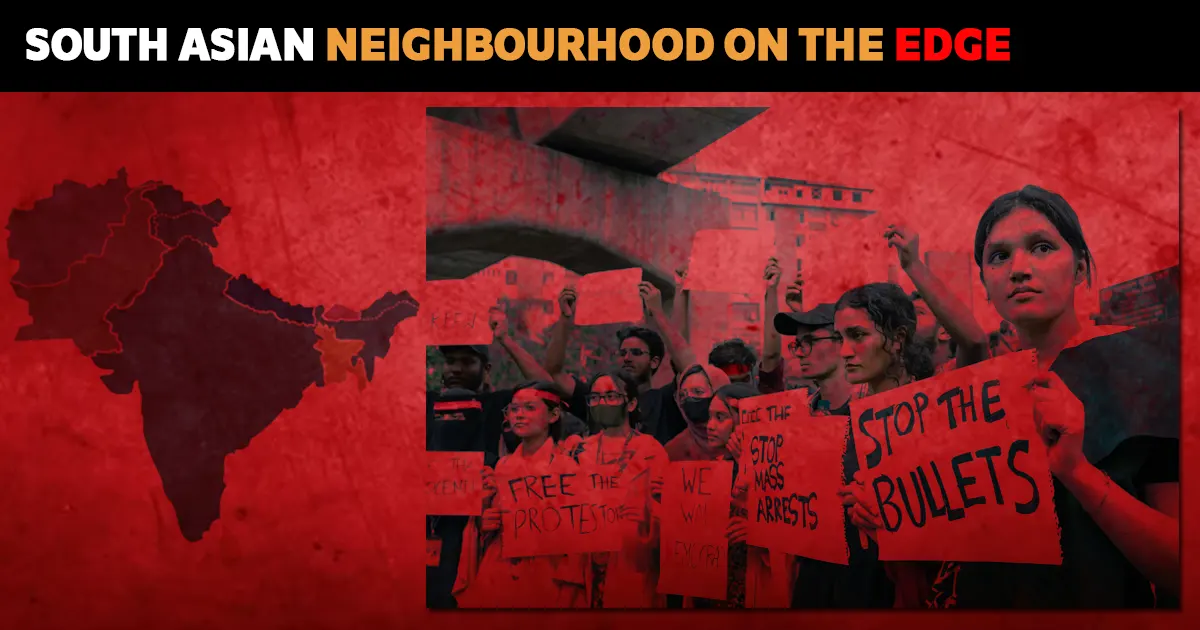
India, Pakistan, and Bangladesh are experiencing heightened political and social tensions, primarily driven by religious nationalism and the entanglement of ideology with state governance. These challenges risk undermining regional stability and democratic values.
Issues
- Rise of Religious Nationalism
- India: The normalization of majoritarianism is evident through policies, hate speech, and the marginalization of minorities.
- Pakistan: The use of religious identity as state ideology risks internal fractures, especially targeting Shia and Ahmadiyya communities, once external enemies are exhausted.
- Bangladesh: The growing influence of Islamists poses threats to minorities, alongside authoritarian governance trends and a denial of communal tensions.
- Democratic Backsliding
- India: Governance practices indirectly encourage religious conflicts rather than fostering democratic inclusiveness.
- Pakistan: A widening disconnect between public sentiment and military authority sustains political crises.
- Bangladesh: Political instability is exacerbated by ongoing rivalries between major political parties, undermining democratic processes.
- Targeted Conflicts
All three nations are revisiting unresolved issues from 1947, using identity-based hostilities as a political tool rather than prioritizing inclusive development.
Challenges
- Fragmented Identities
- India: Religious nationalism threatens the nation’s pluralistic fabric.
- Pakistan: Persistent efforts to define a national identity deepen internal divisions.
- Bangladesh: Performative secularism fails to address underlying communal insecurities.
- Internal vs. External Blame
Governments in the region often exploit issues in neighboring countries to deflect domestic criticism, such as India citing Bangladesh’s minority issues to bolster internal narratives.
- Erosion of Pluralism
An increasing intolerance towards diversity and dissent signals a collapse of pluralistic values in the region.
Implications
- Mutual Instability: Interconnected insecurities heighten the risk of regional conflict.
- Democratic Erosion: Authoritarian trends weaken public trust and damage international reputations.
- Human Rights Violations: Vulnerable minorities face increased risks due to targeted hostilities.
Measures for Stability
- Strengthening Democracy
- Foster institutional reforms to promote inclusivity and pluralism.
- Encourage dialogue to prevent political blame games and recriminations.
- Regional Cooperation
- Avoid exploiting neighboring tensions for domestic gains.
- Create forums for regional collaboration to address socio-political challenges collectively.
- Tackling Root Causes
- Invest in education and grassroots initiatives to counter radical ideologies.
- Reassess state ideologies to adopt governance models that emphasize secularism and inclusivity.
Conclusion
State-driven religious nationalism poses a severe threat to democracy, societal harmony, and regional peace. A renewed commitment to pluralism, dialogue, and democratic principles is essential to safeguard stability and foster sustainable development in South Asia.
[box]”Examine the impact of rising religious nationalism on democracy, pluralism, and regional stability in India, Pakistan, and Bangladesh. Suggest measures to strengthen inclusivity and democratic governance in South Asia.”
[button color=”purple ” size=”medium” link=”https://forms.gle/Wzz7M6oVE4bQS8Ws8″ icon=”” target=”true”]Upload Answer[/button]
[/box]




